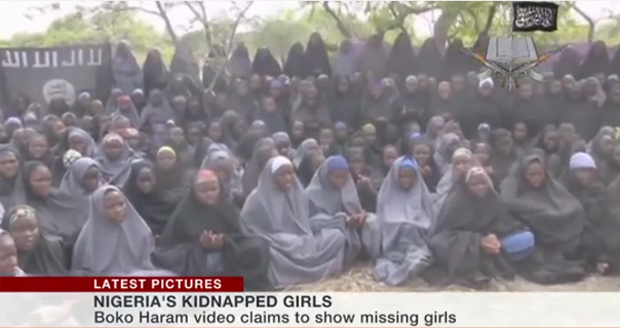More than three weeks after the abduction of over 200 schoolgirls from the northern Nigerian town of Chibok by Boko Haram (BH), an Islamist militant group, the world is finally awake to the tragedy.
While Michelle Obama tweeted a photo of herself displaying the hashtag #BringBackOurGirls, Angelina Jolie said she was “sickened” by the “unthinkable cruelty” and has expressed her anger.
“I heard about it just a few days back when a friend posted an article on Facebook. I was stunned beyond words,” said 19-year old college student Iqra Moazzam, in Karachi, who cannot get over the fact that the girls may have already been sold.
Last week, BH’s leader Abubakar Shekau, threatened to “sell [the girls] in the market” into slavery.
“Not only was the Muslim community slow to respond but the West was also slow to respond,” pointed out Aurangzeb Haneef, who teaches Islamic Studies at the Department of Humanities and Social Sciences at the Lahore University of Management Sciences. He said there was also some discussion on whether the response would have been quicker had the girls been white.
Boko Haram came about in 2009 in an attempt to impose Islamic law in all 36 Nigerian states. It has been behind killing of thousands of people in Nigeria in recent years and known to have links with other radical Islamist groups in North Africa and Sahel.
“I think they have defiled the name of Islam and added one more stain on the Muslim Ummah. I’m infuriated they are calling themselves Muslims; there is not a shred of Islam in their evil deed,” Moazzam said.
And yet surprisingly, there has been no word of condemnation from any religious institution, no indignation from the pulpit by imams during the weekly Friday sermons and no remonstration from the people in the Islamic world.
In September 2012, video-sharing website YouTube put up a 14-minute clip of Innocence of Muslims, produced by an American that was disrespectful of Islam, Muslims and the Prophet Muhammad, which sent a wave of protests throughout the Muslim world. In Pakistan, complete mayhem broke out: 30 people were killed and over 300 were injured.
The 12 cartoons published on 30 September 2005 by the Danish newspaper Jyllands-Posten of Prophet Muhammad, and which the Muslims found extremely and deliberately offensive, led to attempts on the life of the cartoonist and arson attempt made on the newspaper office.
Khalid Zaheer, an eminent religious scholar and vice-president of Al-Mawrid, a foundation for Islamic research and education, explained: “People come to the streets for issues about which they are sensitised by their scholars. Blasphemy is a topic that concerns the ulema (scholars) more because they have literature speaking against it.”
But he said: “Killing in the name of Islam is either considered an exaggerated propaganda, justified jihad, or atrocities done by some enemies who have conspired to malign Islam.” He said the narrow view of the world that is taught in madrassas and promoted in mosques causes non-issues to be made a matter of life and death and real issues to be ignored as if they don’t exist.
Haneef also attributed the inaction on the street to lack of response to the episode by the religious parties. He added: “Since the victims in this case are not Muslims (although some reports suggested that a few of them were Muslims) and since the accused here claim some kind of Islam, therefore, there has been understandable inertia on the part of Islamic parties to criticise BH.”
Unfortunately, pointed out Haneef: “Common Muslims are reluctant to take up issues involving atrocities against non-Muslims. Few people understand that these atrocities are in the name of Islam — Islam is being hurt here — yet they don’t feel compelled enough to raise their voice against BH.”
The same sentiment was endorsed by peace activist, Dr Pervez Hoodbhoy, who is also an academic. “I am sure that most Muslims do not approve of Muslims killing non-Muslims or other Muslims, but this does not raise passions in the same way.”
He also said: “Most Muslims today do disapprove of the mass abduction and sale of the Nigerian girls, but they prefer silence. There is vague discomfort that being too loud might cause Islamic fundamentals to come under scrutiny, something that is best avoided in these dangerous times.”
Hoodbhoy explained that with BH at war with those they consider infidels: “Women captured during tribal wars were part of the war booty and the Holy Quran is completely explicit on the distribution of every kind of booty, including women. Of course, as with slavery, most Muslims regard these verses as meant for those times only.” He said that was the takfiri (a Muslim who accuses another Muslim of apostasy) philosophy of the BH.
Khadeja Ebrahim 12, studying in Class 7, at a British school in Karachi likened the Nigerian militant group to the Tehreek-e-Taliban Pakistan (TTP). “They seem like the Taliban we have in Pakistan, who attacked Malala and believe those seeking western-style education are committing a sin,” she told Index. Asked if she felt scared she nodded saying: “If it can happen in Nigeria, it can happen here in Pakistan and in Karachi too.”
Still, Hoodbhoy, finds the Taliban quite gentle when compared to the BH. “While the TTP does mount suicide attacks, and makes video tapes football matches played with the heads of decapitated Pakistan soldiers, the techniques employed by BH are brutal beyond description.”
This article was updated at 11:46 on 13 May, 2014.
This article was posted on May 13, 2014 at indexoncensorship.org





